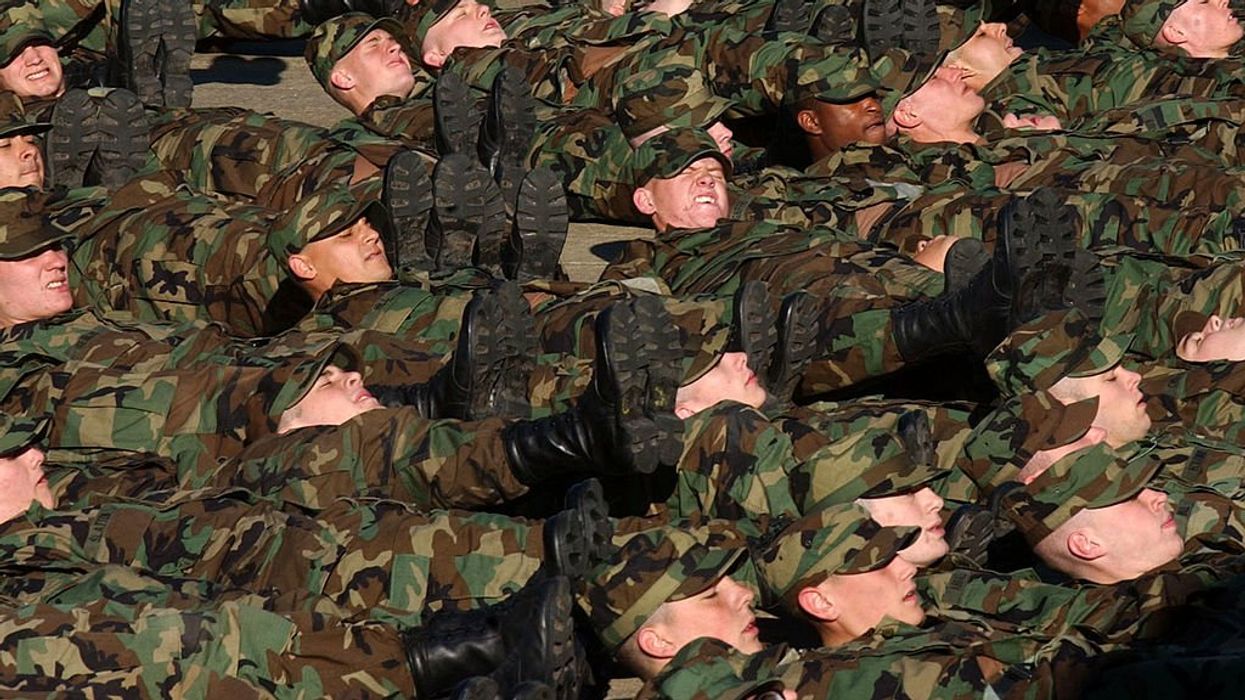
Barry Williams/Getty Images

The absence of self-awareness revealed by a story about not having everything you want for a whole 21 hours is the product of life in a comfort cage, trapped by privilege.
In the summer of 1999, I spent 14 weeks learning to shoot people.
Well, and to stab them with a bayonet. "Blood makes the grass grow green," and please do inquire regarding my war face.
Georgia is unpleasant in summer, and OSUT — one-station unit training, the extended version of basic training that the Army grants to infantrymen as a very special personal gift — is exceptionally tedious.
In the movies, basic training involves a lot of dramatic shouting and high-intensity confrontation, and somebody's always banging on a metal trash can. In real life, basic training involves a lot of standing around, a lot of “do it again,” and a lot of regimentation. In the heat. With bugs.
Frequent question: “Are we really just supposed to stand here?” Yes, kid. Yes, you are.
Deep into that cycle of dullness and infantilization but with hand grenades, we loaded into the cattle trucks that the army doesn’t use any more and were hauled like livestock to the McKenna MOUT range, way out at the back of what was then called Fort Benning. I don’t know what Fort Benning is called now, and I don’t wish to know.
You can have too much of anything, including the absence of suffering.
MOUT stands for military operations on urban terrain: fighting in cities. The MOUT site is where trainees learn to stack up and take doors, with blanks in their rifles and MILES gear strapped to their bodies. The MILES gear beeps a lot, because you get “shot” over and over and over again, which leads you to wonder if stacking up and taking doors is a good idea.
The plan was for a full day of fake room-clearing, then dinner, then a long session of night MOUT in the darkness, then a few hours in our sleeping bags on site, then more training. But the cadre who ran the training area somehow didn't get the memo. When trucked-in dinner was done — breaded meat object, scoop of rice, gray boiled vegetables — we lined up for training that suddenly vanished. Our drill sergeants were there, but their counterparts weren’t. There was no one around to run the place.
Basic training is about as pleasant for drill sergeants as it is for everyone else, and they tend to work long days. Marriages, I’m told, encounter certain challenges during a drill sergeant assignment, and the man in the round brown is glad to eventually return to a line unit where he can just prepare for war and get some personal time like a normal human being. So the collapse of our night training session was greeted with a barely concealed relief by our human-after-all tormenters, who mostly fled for a rare evening at home.
Unsupervised, but with the threat that supervision could, you better believe it, reappear at any moment, a company of young men spread sleeping bags on the ground in the remarkably early evening. We slept by platoon, of course, in squads, with sleeping bags dress-right-dress and in good military order.
But an extraordinary sense of leisure spread across the grass at the edges of McKenna MOUT. Untasked and unsupervised, a big group of military trainees started lounging around like the denizens of an opium den. Boots came off. There was a lot of yawning, a lot of quiet talking, some relaxed laughter.
In my memory — and there is no way I’m fact-checking this — McKenna sits on a plateau, with sweeping views of peaceful woods. We watched the sun set, peaceful and calm. In the middle of the night, someone woke me for an hour of fire watch, and I wandered around in circles in the silence with a deep sense of well-being. Then I climbed back into my sleeping bag and went to sleep, instantly and easily.
My feeling, in that place, was one of extremely rare comfort — in a sweat-soaked uniform, probably smelling like a goat, reclining on the ground in a government-issued bag with no pillow or sleeping pad. It felt like the Four Seasons, but significantly better.
I’ve been thinking about this experience for a week, because — hey, look, he’s getting to the point! — of the recent anti-Israel sit-in at Vanderbilt University. A group of undergraduates occupied the administration building for almost a whole day, then emerged to tell harrowing stories about the hardships they had faced in their brave confrontation with power. You can watch their story here.
“For 21 hours, we were deprived of medical attention, we were deprived of sleep, we were deprived of food, water, resources.” Then, brace yourself, the police woke them at 5:30 in the morning to arrest them. Without even letting them have a latte first, the fascists! Can you even imagine having to wake up at 5:30?
The absence of self-awareness revealed by a story about not having everything you want for a whole 21 hours is the product of life in a comfort cage, trapped by privilege. You can have too much of anything, including the absence of suffering.
Affluenza is a serious illness, and its most ironic symptom is the inability to perceive comfort that’s caused by the experience of never feeling what discomfort is like. Your mind needs the contrast to see varying states of being.
I wish those young men and women discomfort, so that they can one day feel pleasure. I suspect that a dose of this medicine would go a long way for quite a few people in an excessively comfortable time and place. May we never find out, I guess.
Chris Bray